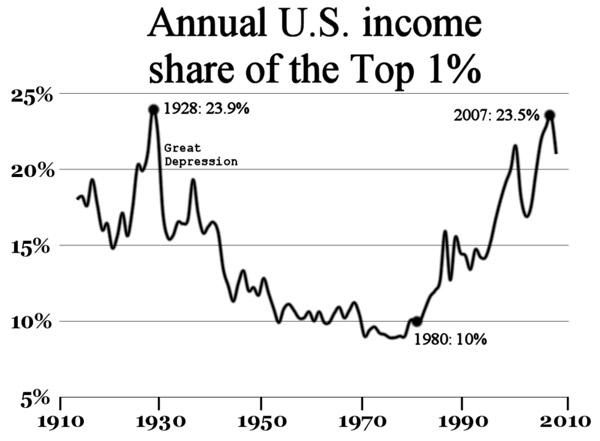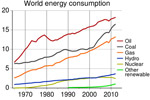The link between good economic policy and climate change mitigation is instigated by policies such as the triple-bottom line, carbon limitations, and pro-environmental legislation. However, economic inequality is a little explored piece of the successful fight against climate change. For climate change mitigation and good economic policy to work, economic growth must be broad-based.
Indeed, the inability for the United States to make a coherent and progressive stance on climate change has effectively stymied the global initiative—and is in part due to growing inequality. Due to the nation’s market size and political power, U.S. policy is often a decisive factor for many global issues.
Climate change policy is no different. The Kyoto Protocol, ratified during the 2001 Marrakesh Accords, was designed to create a cap-and-trade system to price and, thereby, reduce carbon emissions. The Protocol artificially created demand for carbon reduction credits by limiting a nation’s carbon emissions, and decreasing that limit each year. However, the Kyoto Protocol has largely been seen as ineffective.
Why? Not discounting faulty administration of the plan, the nail in the coffin was the lack of demand for carbon reduction credits. The U.S. Senate and President George W. Bush refused to ratify the Protocol, citing as their reason that developing nations were not yoked to the same binding emission reduction targets. Because the mammoth American economy was not legislated to “demand” carbon reduction credits, there was never enough supply. This undermined the international political and financial integrity of the initiative.
One reason why American leaders were not compelled to ratify the Kyoto Protocol was public apathy on the subject. While one contingent was vocal, the movement was not the groundswell that it had become in Europe. This apathy is rooted in several factors, one of which was income inequality. When there is a high degree of inequality between the members of a society, the concept of “relative poverty” becomes potent.
Relative poverty means that an individual may not necessarily be poor on the global scale. However, when compared to very rich neighbors, that same individual may feel left out and often focus all their energy on achieving a higher socioeconomic level. Or worse yet, they may feel resentment over being disenfranchised. Either way, relative poverty leaves a large portion of a populace distracted from long-term or “big picture” issues. The poor do not feel they have the financial lee-way to focus on anything other than just getting by.
If a group of people feeling constrained by lack of financial leeway is broad enough (i.e., not just a small portion of the underprivileged), the masses will not be concerned with much beyond immediate goals. Economist Jeffrey Sachs of the Earth Institute has written widely on the subject of the poverty trap in developing nations and insinuates that the broken institutional infrastructure extends the rules of the poverty trap to the United States.
 Damage to the town of Mantoloking, New Jersey from Hurricane Sandy. Photo in the public domain.
Damage to the town of Mantoloking, New Jersey from Hurricane Sandy. Photo in the public domain.
A poverty trap happens when a negative feedback loop at a certain socioeconomic level results in a self-perpetuating cycle. It can and does exist in developed countries as well as developing countries. Out of necessity, families without financial stability often focus on immediate needs, lack foresight, and suffer from considerably higher stress levels which lead to difficulty concentrating. These traits are taught to the next generation, feeding back to encourage decision-making that is narrow and focused on the short-term. Where this feedback loop leads to increasingly negative outcomes marks the poverty trap.
The poverty trap in a country like the U.S. can lead to an apathetic and uneducated electorate incapable of considering long-term issues like climate change mitigation. Indeed, the single most important feedback cycle of the poverty trap is education. Lack of social safety networks and good public education results in a higher probability that children will slip through the cracks and form a generation of increasingly less-educated individuals.
A well-educated electorate depends on a broad, informed middle class with a solid economic footing. There are many measurements that show America’s diminishing middle class. The oft-touted “Graph of The 1%”—the percent of income distributed to the top one percent of the American populace—shows that income inequality is higher than it has been since the Great Depression.
Nobel Laureate Economist Joseph Stiglitz helps to lead this discussion in publications such as The Price of Inequality: How Today’s Divided Society Endangers Our Future. Stiglitz describes the many maladies that inequality has created and paints the environment as one of the victims of American inequality. He even says that environmental damage has been exacerbated by corporate media consolidation side-lining the issue, as well as lack of political independence from funders.
The nebulous nature and global complexity of the climate change issue must be faced by leaders representing a broad-based, well-educated populace. Without widespread education and prosperity, access to the information necessary to push for intangible issues like climate change is beyond the public’s reach.
As Earth reaches new heights of atmospheric carbon concentrations, the urgency of slowing greenhouse gas emissions is at a paralleled high point. Affecting this global change requires the enfranchisement of American legislative bodies powered by an educated populace. However, if we don’t widen the income base and steer families into the realm of financial stability, we may not ever have that social catalyst. There are ways of broadening income and strengthening the middle class. For the sake of our shared climatic future, we need to broaden economic development to all.

Economic inequality in the U.S. as shown by income percentage held by top 1 percent. Chart by: RoyBoy/Creative Commons 3.0.
Related articles
Clock is ticking on fossil fuels: for first time IPCC scientists outline global carbon budget

(10/01/2013) The world’s leading climate scientists have set out in detail for the first time how much more carbon dioxide humans can pour into the atmosphere without triggering dangerous levels of climate change—and concluded that more than half of that global allowance has been used up.

(09/28/2013) Human actions are responsible for warming the Earth, reconfirms the landmark Intergovernmental Panel on Climate
Change (IPCC) report released today, the first mammoth report on the physical science of climate change issued in seven years. Scientists now say they are 95-100 percent certain that human actions—such as burning fossil fuels and cutting down forests—are behind the observed rise in global temperatures since at least 1950. Average temperatures have risen 0.85 degrees Celsius since 1880, but the new report warns that depending on how much more fossil fuels are burnt, temperature rises could exceed 4 degrees Celsius (9 degrees Fahrenheit) with untold consequences for global society.
(10/28/2013) China’s largest city and one of the world’s biggest, Shanghai, is set to ban coal burning in just four years, according to a new Clean Air Action Plan. The city-wide ban on coal burning is one effort among many to get Shanghai’s infamous smog under control as well as another sign that China has begun to take its pollution problems more seriously.
Global warming could shift tropical rainfall
(10/21/2013) Ongoing burning of fossil fuels could flip which portion of the tropics receive more rainfall: the southern hemisphere or the northern. Currently, the northern hemisphere tropics is the wetter of the two, but why this is has long baffled scientists. Now, new research in Nature Geoscience has discovered that rainfall in the tropics is in part driven by massive ocean currents that travel back-and-forth between the Arctic and Antarctic, a process known as ocean overturning circulation.
France upholds nationwide ban on fracking
(10/14/2013) France’s landmark ban on fracking has survived constitutional challenges lobbed by U.S.-company, Schuepbach Energy. On Friday, the nation’s Constitutional Council decided that the ban did not violate France’s constitution. Passed in 2011 under then President Nicolas Sarkozy, the ban has since been upheld by current President Francios Hollande.
Sea and storm: coastal habitats offer strongest defense

(10/11/2013) Surging storms and rising seas threaten millions of U.S. residents and billions of dollars in property along coastlines. The nation’s strongest defense, according to a new study by scientists with the Natural Capital Project at the Stanford Woods Institute for the Environment, comes from natural coastal habitats.
Divestment campaign could cause considerable damage to fossil fuel industry
(10/08/2013) A campaign to persuade investors to take their money out of the fossil fuel sector is growing faster than any previous divestment campaign and could cause significant damage to coal, oil and gas companies, according to a study from the University of Oxford. The report compares the current fossil fuel divestment campaign, which has attracted 41 institutions since 2010, with those against tobacco, apartheid in South Africa, armaments, gambling and pornography. It concludes that the direct financial impact of such campaigns on share prices or the ability to raise funds is small but the reputational damage can still have major financial consequences.